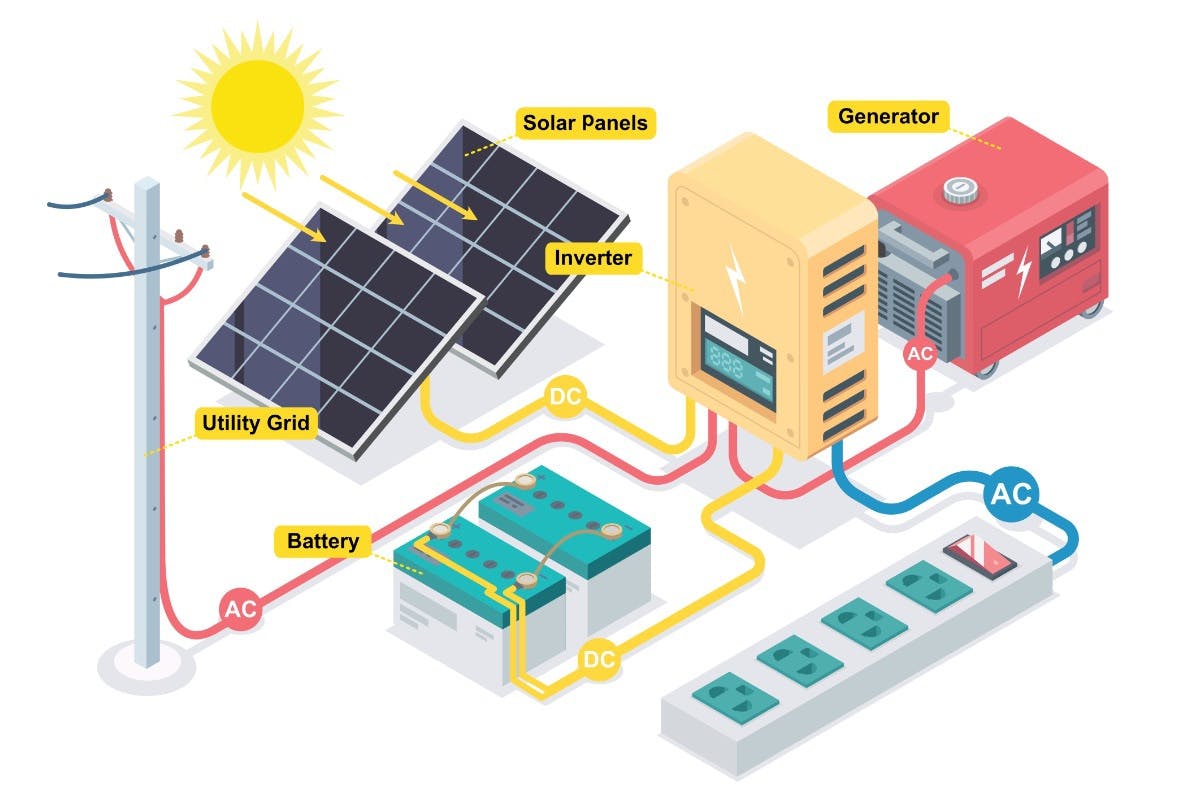Not sure where to ask this, but we are looking into building a small cabin for our permanent living space.
We are looking for an inverter/generator that we can hook up batteries and future solar panels to and it also be connected to the grid while we are setting everything up/building.
Does anybody have any experience and want to give me suggestions on the type of equipment to do this?
The types of generators I'm seeing ATM output AC power (have their own inverter) and I'm not sure how I would use something like this in the system.
Something like this schematic shows an inverter that can take both AC and DC power, but I'm not finding anything that seems to fit that bill.

I would imagine we want to spend the most on the inverter to future-proof our needs, and a good enough generator to supply the surge/max-wattage of the inverter if the power of our city goes out (or at least enough to run a fridge and/or power tools while we are building)
Edit: Something in the 5000-8000W range would be enough for our needs. If you have any battery-bank suggestions (I can only find a max of 100Ah batteries) that would be great too.
Not an expert on off grid solutions, but I spent some time building mobile off-grid systems using solar, shore power (grid input) and LifePo battery banks.
The inverter you are looking for I believe is something like what Victron offers. Victron makes really nice stuff, super techy and customizable. This unit here is able to accept two AC inputs and has built in transfer switch. It's a battery charger, inverter and transfer switch in one package.
https://www.victronenergy.com/inverters/phoenix-inverter-smart#pd-nav-secondimage
The only thing missing from this equation would be a suitable solar charge controller, which Victron also has plenty of offerings for. A plus to sticking with Victron is that your monitoring can all be done on one app. Some Victron devices also talk to each other and optimize parameters to extend battery life, favor off grid or on grid power, etc.
For battery banks, I've had good experience with the EG4 racks. They are power dense, have great BMS systems that are customizable, and are priced affordably. You can run these in parallel to increase your AH.
https://signaturesolar.com/eg4-lifepower4-v2-lithium-battery-48v-100ah-server-rack-battery-ul1973-ul9540a-10-year-warranty/
Lots of technical considerations go into selecting proper components, but maybe this will help get you started.
In my house if the power goes out, the solar power doesn't do anything. I'm not sure why it is like this, but you have to output the power to the grid, then it discounts on your bill, but the power still comes from the usual grid, the generator just helps provide power to it. It might be due to regulation, but idk
The inverters in the solar panels are synchronized to the grid. No power in the grid means they don't have anything to synchronize the AC generation to. There are pricier inverters that can deal with it and step in when the grid fails.
I don't know much about legit installed inverters. I do know that portable LiFePO4 power stations (battery + inverter) are starting to get commodity priced (3000W output for around $1k) if that is at all useful info. They are popular among glampers and traveling off-gridderd, like people that live in sturdy tents or out of vans. They usually have solar input ports and often have battery extension options.
Something to weigh against your other, probably better options!
Edit: here is an example that comes with a solar panel and can be attached to more batteries (possibly only Bluetti ones?): https://www.amazon.com/BLUETTI-Portable-AC200L-Generator-Emergency/dp/B0CR9WBHXS/
Sure it is, the only thing I'd pay for (and you're required to have a licensed professional do) is get you connected to the grid correctly so you don't kill linemen when power goes out and generator/batteries kick in
Sure, but like wiring a switch? Ok. Designing the wiring for your house? Maybe not. Fixing a sink? Sure. Putting in a new septic tank? Maybe call the pros.
Idk it's a matter of scale. One thing you could do as a compromise is call up a local resi solar installer and have them quote the work. As part of that process they should give you a broad overview of the work, and allow you to ask any questions including major equipment choices from a licensed professional. Then when you get the price you can choose to move forward or not, but regardless you will be better informed about what you're going to undertake.
Electrical equipment behaves weirdly. There's weird shit like oscillation that can multiply the voltage on a line if you have some sort of synchronization issues between the generator, the inverter, and the grid. This shit can kill you so be careful.
i kept seeing ads on facebook for generac bullshit (looked like what the tesla power wall was supposed to be, which I'm just realizing is a phrase I haven't heard in years, lmao, lol) indicating there are some sort of government subsidies to get them installed, so I would also maybe consider looking into whether there are subsidies for this sort of thing





